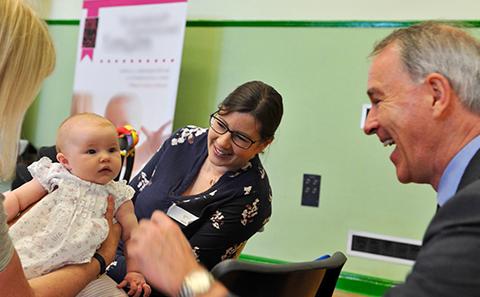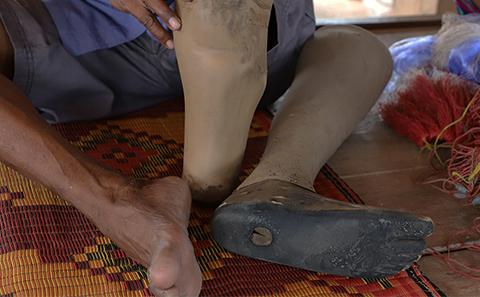Improving maternal and child health in India
Southampton research is influencing newborn and maternal health policy in India
Improving maternal and child health is a global challenge that is particularly pressing in developing countries. According to UNICEF, globally around 800 women die every day from preventable causes related to pregnancy and childbirth; one in five of these women are from India.
At the forefront of international efforts to tackle this problem, Southampton researchers are leading a scientific evaluation of health innovations brought in by the Indian government to improve pregnancy outcomes and children’s health.
The innovations include training health workers to support pregnant women and providing specialised neonatal units to care for preterm and sick babies. They are part of the Norway-India Partnership Initiative (NIPI), a bilateral programme between the governments of Norway and India aimed at improving child and maternal health in rural areas of India. A key goal is to increase the use of quality institutional care – that is, care within a hospital setting – during childbirth.
In some northern states of India and many other developing countries, unhygienic conditions and lack of access to skilled care at birth substantially increase the risk of neonatal and maternal mortality. Promoting quality institutional care during childbirth is vital.
Since 2006, NIPI has provided training for more than 40,000 women in the communities of 13 districts of India to become front-line health workers. Known as ASHAs (Accredited Social Health Activists), these health workers have provided around a million home visits to support pregnant women, as well as home-based care for more than 700,000 children up to one year old. They ensure pregnant women receive appropriate antenatal care, accompany them to hospital for the birth, and give advice on a whole host of topics, including breastfeeding, infant nutrition and immunisations.
Commissioned by the Norwegian Agency for Development Cooperation (Norad) in collaboration with the Indian government, Professor Sabu Padmadas and fellow University of Southampton expert in global health, Professor Zoe Matthews, are leading an independent scientific evaluation of the NIPI innovations. Working with academic colleagues in India, Norway and at the World Health Organization, they have analysed data from a range of sources, including government data, focus groups, knowledge tests of health providers and India’s National Family Health Survey, to build up a picture of the health impacts of NIPI. They have also visited the NIPI districts and worked closely with healthcare professionals.
This evaluation has indicated that the NIPI innovations are having a positive outcome, with an upscaling of maternal and newborn care across larger states in the northern region of India. “We have seen that the ASHAs have a positive impact on health in local communities; they are trusted and well known by the families, which is notable in rural India, where women traditionally have a low status,” says Sabu. The team is providing feedback on where services have room for improvement.
The first two phases of NIPI were highly successful and the project has now entered its third phase, with a focus on providing catalytic technical support to aspirational districts in India to continue to improve practices in maternal and newborn child health, as well as sharing best practice more widely.
We are identifying areas of best practice and sharing these with the World Health Organization, so that they can benefit millions of vulnerable people across other low- and middle-income settings of Asia and Africa.
As India transitions rapidly to lower fertility rates, challenges remain, especially in some of the economically less developed districts within larger states, Sabu explains.
“Our research now focuses on applying geospatial techniques to map the availability and access to maternal and newborn healthcare in remote districts, facilitated by our University India Centre, with a fantastic technical team led by Professor Andy Tatem of WorldPop.”
Related Staff Member
Related Staff Member
Related Staff Member
You might also be interested in:

Securing a healthy future
Southampton is conducting pioneering research into the effect of nutrition before and during pregnancy on childhood obesity

A 'step change' in prosthetics
Improving access to prosthetic limbs in Cambodia

.JPG_SIA_JPG_fit_to_width_SQUARE.jpg)
